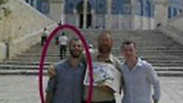
'Yehudah Glick was targeted on social networks in Arabic by those engaged with the Temple Mount'
When will Israel tackle online incitement in Arabic?
Op-ed: A simple Google search would have detected Muslim nationalists' threats against Yehudah Glick; but in the Justice Ministry, no one seems to understand Arabic.
July was a difficult month. There are such months here and there in 100 years of conflict. The optimists were less optimistic, the status quo fanatics were less static. And on the streets, there was a mess.
In the Middle East, such months are quickly forgotten, and bloody chapters are rewritten all the time. There are only two rules which remain throughout the course of time, always true. The rule of identity and the balance of power.
The identity rule forces one to take a side. In national conflicts, everyone has an opinion. One cannot live within a conflict and remain neutral. The absolute majority of Israeli Jews support the State of Israel even when they don't like the government. Palestinians from Ramallah support Hamas even when they see it as an enemy.
Those looking for a Palestinian leader to condemn Hamas for firing rockets at Israel don't understand this rule. Those looking for the Palestinian leader who will condemn terror are unfamiliar with the place he comes from. Those caught in the middle – like Israel's Arabs – remain silent at best or identify with the other in the worst case.
The second rule is the balance between a government and a public. A national conflict creates blood and sentiments. Where the government is present, the public restrains itself on the streets; where the government is absent, the sentiments decide. There is no void, a zero-sum game between a state and its streets.
On July 3, after countless racist incidents, Justice Minister Tzipi Livni announced the launch of a hotline for complaints about incitement in the social media. Democratic governments are not on the Internet. It's mostly good, but in cases of racism and incitement it's bad.
After a number of ugly incidents against Israeli Arabs, the Justice Ministry's website reported of emergency activity to stop the dangerous wave of incitement. Five days later, the war in the south broke out. The dangerous wave of incitement was seen as minor compared to a much more dangerous wave of rockets. The hotline remained active.
Livni was right. There is a lot of filth on the Web. Once a person would curse quietly, spout words in closed rooms. Today he curses the computer without looking anyone in the eyes. He does it on Tzipi Livni's page, on an occasional Arab's page, on the pages of leftists, presidents and journalists. He swears everywhere until it seems that we have a virtual state here with Tourette syndrome.
But alongside the Livni-style justice, there is also a problem. The line of incitement in Israel passes through the line of language. What happens in the Hebrew language is dealt with – and that's a good thing. The incitement in Arabic is hidden.
Social networks in Arabic are filled with harsh statements against Jews, with racism and hatred. Price tag incidents against Arabs are covered by the media, while price tag incidents against Jews fade away. What is missing is proportionality, as well as identical treatment dictated by the idea of equality before the law.
The Yehudah Glick case is a concrete example. Glick is the star of the social networks in Arabic among those engaged with the Temple Mount. Religious Muslims hate him; nationalists targeted him.
This could have been easily detected – a Google search brings up the threats – but there is no one to look for them. The Justice Ministry's keyboards have no Arabic on them, the telephone receptionists speak no Arabic, the mind lacks Arabic.
I am concerned about the incitement and radicalization just as much as the readers of editorials in Haaretz. On the week in which we mark the anniversary of Yitzhak Rabin's murder, there is no need for proof of dangerousness, but incitement does not depend on religion and ideology. This applies to any time, any religion, any social network. It creates results and numbers.
For every Jewish hooligan who has hurt innocent Arabs in the past few months there have been dozens of Arabs who threw stones at innocent people. Neither of them is the majority. Both need to be dealt with.
There are two ways to deal with incitement on the social networks. One is to ignore it and let the talkbackers blow off steam. The other is to fight and set boundaries like in a civilized country. Those who believe in sovereignty and in the rule of law must implement them to the same extent both in Yitzhar and in Wadi Joz.
If the Justice Ministry doesn’t understand Arabic, it's time to learn.










